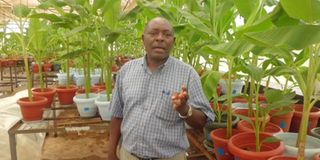Why the push for biotech should be fair

Genetically modified banana in a green house at Kawanda research station. While the use of biotechnology in agriculture has benefits, it is also a contentious issue world over, including Uganda.Photo by Lominda Afedraru
Ensuring food security is a global agenda hence the need to devise means to produce enough food to feed a growing population amid various challenges and constraints.
So, biotechnology in agriculture is being used to develop plant and animal varieties resistant or tolerant to pests and diseases, can adapt to climate change while maintaining or boosting food nutrient.
In Uganda, scientists are researching a number of crops using biotechnology.
These include cassava varieties resistant to Cassava Mosaic and Cassava Brown Streak Viruses, banana varieties resistant to black sigatoka, nematodes, bacterial wilt and also rich in vitamin and iron, improved sweet potato varieties, drought-tolerant maize, and rice that grow in soils with fewer nutrients.
Achievements
Much as biotechnology is contentious and has met resistance in different parts of the world, including Uganda, every year the World Food Prize is awarded to recognise achievements in agriculture and issues related to food policy.
The event is held in memory of the founder, Norman Borlaug, who won the 1970 Nobel Peace Prize for developing wheat strains that kicked off the Green Revolution in Asia.
At an award ceremony held in Iowa, US, three scientists Marc Van Montagu of Belgium, and Mary-Dell Chilton and Robert T. Fraley of US received the 2013 World Food Prize for their individual breakthrough achievements in founding, developing, and applying modern agricultural biotechnology.
“The pioneering work of the three scientists contributed to the emergence of a new term, ‘agricultural biotechnology’, and set the stage for engineering crops with novel traits that improved yields and conferred resistance to insects and disease, as well as tolerance to adverse environmental conditions. Their work has made it possible for farmers in a number of countries to improve the yields of their crops thereby increasing incomes, and feed a growing global population,” read part of the message from the conference organisers.
Open to dialogue
While addressing the meeting, president of Pontifical Council for Justice and Peace, Cardinal Peter Turkson, remarked that scientists using biotechnology has no problem so long as they are using the gift of nature in hope of solving difficulties faced by humans in terms of hunger and must be subjected to moral respect for a common good.
“Dr Borlaug had manure on his boots because he did not only confine his research in the research station but extended it to the fields. Times have changed and recognising science on account of domain means the fruit of research should be opened to dialogue,” he said.
Therefore, scientists must be in position to carry out research while observing justice and fairness. Cardinal Turkson cautioned them to apply precaution to avoid damage to human health.
“Rules of labelling can be observed to make true choice, patents and property rights are also legitimate but must be focused towards feeding the poor and the responsibility of this application lies in the hands of farmers, seed users, sellers and consumers,” he added.
Prof Wilberforce Tushemereirwe, director, National Agricultural Research Laboratories Kawanda, attended the conference and was of the view that recognition is good because agricultural scientists develop products to provide food, improve incomes and better livelihoods.
Ensure safety
“Technology, whether conventional or biotechnology, is all aimed at improving varieties that resist pests and diseases as well as adding nutrients to food for human health,” he said adding that modern biotechnology should not be perceived negatively.
This is because scientists use caution by following scientific guidelines where issues of safety are considered. The research going on in Uganda using biotechnology is aimed at contributing to food security although the products are not yet with the farmers.
He believes Uganda started late with biotechnology, besides, there are groups opposing it especially the law formulated to regulate the products and ensure safety.Citing the drought-tolerant maize on trial in Kasese, Prof Tushemereirwe said farmers will be able to growing the crop even during dry spells and this helps to avert hunger.




